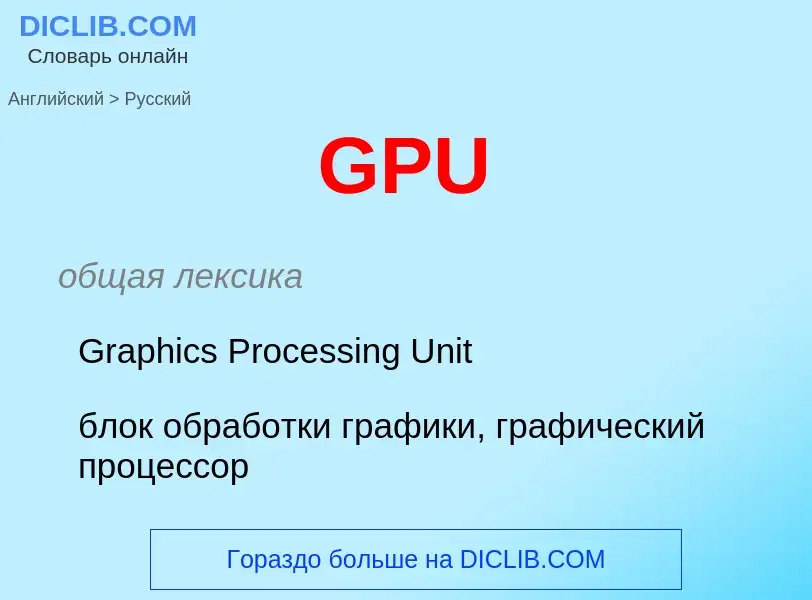Übersetzung und Analyse von Wörtern durch künstliche Intelligenz ChatGPT
Auf dieser Seite erhalten Sie eine detaillierte Analyse eines Wortes oder einer Phrase mithilfe der besten heute verfügbaren Technologie der künstlichen Intelligenz:
- wie das Wort verwendet wird
- Häufigkeit der Nutzung
- es wird häufiger in mündlicher oder schriftlicher Rede verwendet
- Wortübersetzungsoptionen
- Anwendungsbeispiele (mehrere Phrasen mit Übersetzung)
- Etymologie
GPU - Übersetzung nach russisch
общая лексика
Graphics Processing Unit
блок обработки графики, графический процессор
Смотрите также
общая лексика
графический сопроцессор
графический процессор, расположенный на одной плате с ЦП, которому передаётся (или он перехватывает сам) исполнение графических команд. Снижает вычислительную нагрузку на ЦП и повышает быстродействие видеоподсистемы компьютера
Wikipedia
A graphics processing unit (GPU) is a specialized electronic circuit designed to manipulate and alter memory to accelerate the creation of images in a frame buffer intended for output to a display device. GPUs are used in embedded systems, mobile phones, personal computers, workstations, and game consoles.
Modern GPUs are efficient at manipulating computer graphics and image processing. Their parallel structure makes them more efficient than general-purpose central processing units (CPUs) for algorithms that process large blocks of data in parallel. In a personal computer, a GPU can be present on a video card or embedded on the motherboard. In some CPUs, they are embedded on the CPU die.
In the 1970s, the term "GPU" originally stood for graphics processor unit and described a programmable processing unit independently working from the CPU and responsible for graphics manipulation and output. Later, in 1994, Sony used the term (now standing for graphics processing unit) in reference to the PlayStation console's Toshiba-designed Sony GPU in 1994. The term was popularized by Nvidia in 1999, who marketed the GeForce 256 as "the world's first GPU". It was presented as a "single-chip processor with integrated transform, lighting, triangle setup/clipping, and rendering engines". Rival ATI Technologies coined the term "visual processing unit" or VPU with the release of the Radeon 9700 in 2002.

![An [[ASRock]] motherboard with integrated graphics, which has HDMI, VGA and DVI outs. An [[ASRock]] motherboard with integrated graphics, which has HDMI, VGA and DVI outs.](https://commons.wikimedia.org/wiki/Special:FilePath/A790GXH-128M-Motherboard.jpg?width=200)
![Atari [[ANTIC]] microprocessor on an Atari 130XE motherboard Atari [[ANTIC]] microprocessor on an Atari 130XE motherboard](https://commons.wikimedia.org/wiki/Special:FilePath/ANTIC chip on an Atari 130XE motherboard.jpg?width=200)
![ET4000/W32p]] ET4000/W32p]]](https://commons.wikimedia.org/wiki/Special:FilePath/Dstealth32.jpg?width=200)
![The [[IBM 8514]] Micro Channel adapter, with memory add-on. The [[IBM 8514]] Micro Channel adapter, with memory add-on.](https://commons.wikimedia.org/wiki/Special:FilePath/IBM 8514.jpg?width=200)
![IBM PS/55]] IBM PS/55]]](https://commons.wikimedia.org/wiki/Special:FilePath/IBM VGA 90X8941 on PS55.jpg?width=200)
![NEC [[μPD7220]]A NEC [[μPD7220]]A](https://commons.wikimedia.org/wiki/Special:FilePath/NEC D7220.jpg?width=200)
![[[Voodoo3]] 2000 AGP card [[Voodoo3]] 2000 AGP card](https://commons.wikimedia.org/wiki/Special:FilePath/Voodoo3-2000AGP.jpg?width=200)
